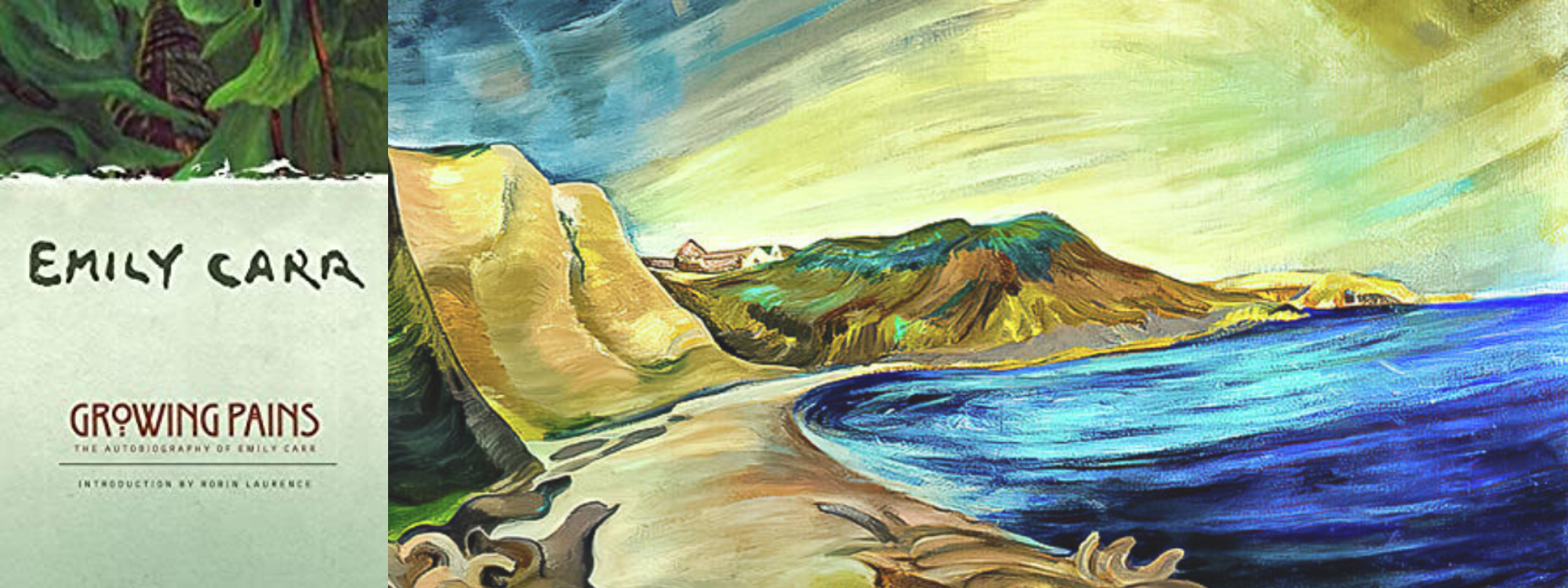One year after the publication of Klee Wyck, The Book of Small appeared. I had wintered in a Nursing Home. Domestic help and fuel problems were difficult owing to war. I was quite eligible for a Nursing Home because I was really ill.
There I lay waiting and waiting for Small to come from the publisher. The publishing houses were under a heavy war strain—men, presses, material; but at last the book came in a smart green jacket with a medallion of the little old Small in the centre.
The Book of Small was entirely different from Klee Wyck. She was bigger. Some people liked her more, some less. The first half of Small was a collection of childhood (our childhood) stories, the life we lived in the far West where Father and Mother pioneered and raised their large family.
The other half of Small was called A Little Town and a Little Girl. It told of little old Victoria before she was even a town. Nearly all the people who lived there were English and they had a good many difficulties to cope with. They had only small Chinaboys as helps, no plumbing, only pumps and wells, no electric light and no telephone. Indians went round the streets selling their beautiful cedar-bark baskets or trading them for old clothes, or peddling clams or pitch wood tied in bundles for the lighting of fires. The Book of Small told of the slow, conservative development of Canada’s most Western city.
My Editor was up north on a business trip. He had waited impatiently for the appearance of Small. She came the day he left. He wrote me, “I suppose you are being swamped with fan mail.”
No, Small lay shut in a drawer. I could not bear to look at her. She lay there for three or more weeks. No reviews, no letters came about The Book of Small. They had followed the appearance of Klee Wyck immediately or within a few days. In bitterness and disappointment I turned to the wall. My Editor came back from the North and, coming to Victoria, dashed into my room.
“The reviews? The letters?”
“There aren’t any. Oh, Ira, she’s flopped, Small has flopped dead, I’m so shamed!” and I cried till I nearly drowned him. He looked perplexed.
“I can’t understand it. Clarke and I both thought she was the equal, if not better than Klee Wyck. She can’t have flopped!”
I hid my shamed face in the pillow.
“I don’t care so much about Small and me, but I’ve disappointed you and Bill Clarke.”
I howled quarts of tears that had been strangled back for three weeks.
“The Press too, Small will be a dead loss to them. I wrote Bill last night and told him how dreadful I felt.”
“Cheer up, remember it’s war time and everything is higgledy-piggledy. There has been a hold-up somewhere. It’s a marvel to get a book published at all these days! All dates are uncertain. Reviewers can’t review till they have got the stuff, nor the booksellers sell till they have the books.”
He left me cheered, but not convinced. I could only wail, “She’s flopped, she’s flopped! Small’s flopped!”
“Silly!” said my Editor, “you’ll see. Small’s all right. Look at the reception Klee Wyck got; Small will too—give her time.”
Letters came from both Mr. and Mrs. Clarke. Kind letters they were, very upset that I should have thought Small had flopped. There had been delays, just as Eye had said, owing to war conditions. The date of publication had had to be postponed several times, the reviews could not come out till the critics got the books and read them. Shipments of books had been late going to the bookstores and libraries. The reviews were just as good, just as complimentary, as those of Klee Wyck.
Eye wrote from Vancouver, “What did I tell you? All who read Small (and everyone is reading her now) love her. Book stores are sold out of copies!”
Mr. Clarke made his autumn trip to the West—dear Bill and his kind little wife felt so sorry about all the doldrums I had been through because of Small. Bill’s first question was, “Is the next book ready? I plan to publish one each year.” The script was ready, but we were deeper than ever in war. Hitler is a nuisance from every possible angle!




0 comments